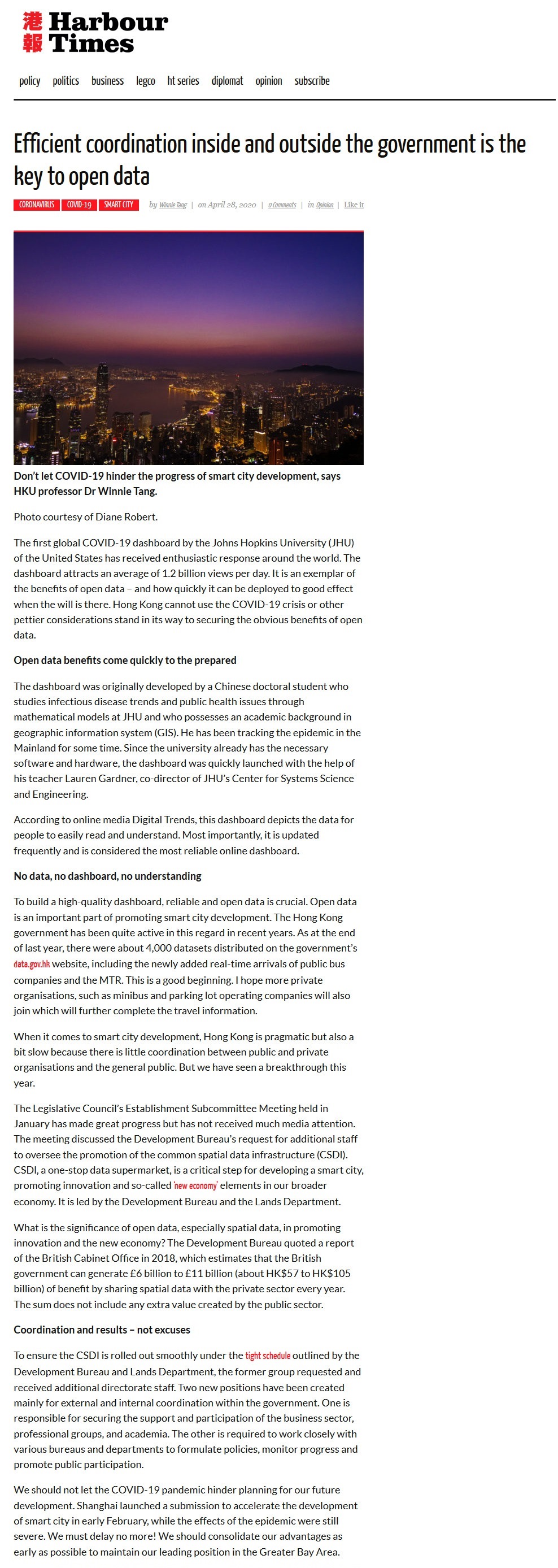網上版請按此

Efficient coordination inside and outside the government is the key to open data
The first global COVID-19 dashboard by the Johns Hopkins University (JHU) of the United States has received enthusiastic response around the world. The dashboard attracts an average of 1.2 billion views per day. It is an exemplar of the benefits of open data – and how quickly it can be deployed to good effect when the will is there. Hong Kong cannot use the COVID-19 crisis or other pettier considerations stand in its way to securing the obvious benefits of open data.
Open data benefits come quickly to the prepared
The dashboard was originally developed by a Chinese doctoral student who studies infectious disease trends and public health issues through mathematical models at JHU and who possesses an academic background in geographic information system (GIS). He has been tracking the epidemic in the Mainland for some time. Since the university already has the necessary software and hardware, the dashboard was quickly launched with the help of his teacher Lauren Gardner, co-director of JHU's Center for Systems Science and Engineering.
According to online media Digital Trends, this dashboard depicts the data for people to easily read and understand. Most importantly, it is updated frequently and is considered the most reliable online dashboard.
No data, no dashboard, no understanding
To build a high-quality dashboard, reliable and open data is crucial. Open data is an important part of promoting smart city development. The Hong Kong government has been quite active in this regard in recent years. As at the end of last year, there were about 4,000 datasets distributed on the government's data.gov.hk website, including the newly added real-time arrivals of public bus companies and the MTR. This is a good beginning. I hope more private organisations, such as minibus and parking lot operating companies will also join which will further complete the travel information.
When it comes to smart city development, Hong Kong is pragmatic but also a bit slow because there is little coordination between public and private organisations and the general public. But we have seen a breakthrough this year.
The Legislative Council's Establishment Subcommittee Meeting held in January has made great progress but has not received much media attention. The meeting discussed the Development Bureau's request for additional staff to oversee the promotion of the common spatial data infrastructure (CSDl). CSDl, a one-stop data supermarket, is a critical step for developing a smart city, promoting innovation and so-called 'new economy' elements in our broader economy. It is led by the Development Bureau and the Lands Department.
What is the significance of open data, especially spatial data, in promoting innovation and the new economy? The Development Bureau quoted a report of the British Cabinet Office in 2018, which estimates that the British government can generate £6 billion to £11 billion (about HK$57 to HK$105 billion) of benefit by sharing spatial data with the private sector every year. The sum does not include any extra value created by the public sector.
Coordination and results – not excuses
To ensure the CSDI is rolled out smoothly under the tight schedule outlined by the Development Bureau and Lands Department, the former group requested and received additional directorate staff. Two new positions have been created mainly for external and internal coordination within the government. One is responsible for securing the support and participation of the business sector, professional groups, and academia. The other is required to work closely with various bureaus and departments to formulate policies, monitor progress and promote public participation.
We should not let the COVID-19 pandemic hinder planning for our future development. Shanghai launched a submission to accelerate the development of smart city in early February, while the effects of the epidemic were still severe. We must delay no more! We should consolidate our advantages as early as possible to maintain our leading position in the Greater Bay Area.
Dr. Winnie Tang
Adjunct Professor, Department of Computer Science, Faculty of Engineering and Faculty of Architecture, The University of Hong Kong